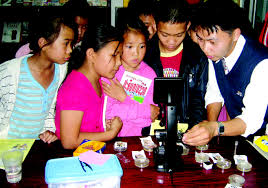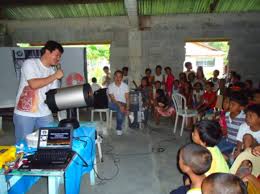Innovations of Educational Technology in the Philippine setting
I.
I.
1. Instead of defining ICT for education in terms of technology literacy or information literacy, the concept of “ICT capability” should be understood and considered as a definition of ICT for education.ICT capability involves technical and cognitive proficiency to access, use, develop, create, and communicate information appropriately using ICT tools. Learners demonstrate this capability by applying technology purposefully to solve problems, analyze and exchange information, develop ideas, create models, and control devices. They are discriminating in their use of information and ICT tools, and systematic in reviewing and evaluating the contribution that ICT can make to their work as it progresses. ICT capability is much broader than acquiring a set of technical competencies in software applications.
2. Along with establishing informatics or computer education as a curricular subject, the overall school
curriculum should be assessed to identify ways in which ICT may enhance learning in both core subject
areas and electives.

3. ICT for education encompasses low and high technologies.



4. In an ICT-supported learning environment, teachers need to act as a guide to facilitate student-centered
learning.

5. School leaders must communicate a vision for ICT in the school and foster an ICT culture that allows all
school staff to be regular users of ICT.

II.
1. Instead of defining ICT for education in terms of technology literacy or information literacy, the concept of “ICT capability” should be understood and considered as a definition of ICT for education.ICT capability involves technical and cognitive proficiency to access, use, develop, create, and communicate information appropriately using ICT tools. Learners demonstrate this capability by applying technology purposefully to solve problems, analyze and exchange information, develop ideas, create models, and control devices. They are discriminating in their use of information and ICT tools, and systematic in reviewing and evaluating the contribution that ICT can make to their work as it progresses. ICT capability is much broader than acquiring a set of technical competencies in software applications.
curriculum should be assessed to identify ways in which ICT may enhance learning in both core subject
areas and electives.

4. In an ICT-supported learning environment, teachers need to act as a guide to facilitate student-centered
learning.
school staff to be regular users of ICT.
II.
Naga City’s class act
BICOL’S model city is trying its best to address its ‘weakest link’ in achieving the Millennium Development Goals: keeping schoolchildren in class to complete elementary education.


THE Naga City School Board has prioritized investments in information technology like the Computer Literacy and Instructional Center for Kids (CLICK) that provided computer hardware to elementary schools.
III.
BICOL’S model city is trying its best to address its ‘weakest link’ in achieving the Millennium Development Goals: keeping schoolchildren in class to complete elementary education.
THE Naga City School Board has prioritized investments in information technology like the Computer Literacy and Instructional Center for Kids (CLICK) that provided computer hardware to elementary schools.
III.
Veritas Parochial School launches Digital Learning Program with Vibal, Acer
When the students of Veritas Parochial School (VPS) returned to school this year, they were greeted by a big, bold sign at the gate: “You are now entering the Chrome Zone, proceed with wonder and excitement.”
The Chromebook as a learning platform is something new in the Philippines, where tablets are still the device used in most schools undertaking mobile education programs. For VPS, the Acer C720 is proving to be most ideal. It is compact, lightweight, and offers a faster, simpler, hassle-free, and secure computing experience. Parents also approve of the Chromebook for its affordability.




IV.
When the students of Veritas Parochial School (VPS) returned to school this year, they were greeted by a big, bold sign at the gate: “You are now entering the Chrome Zone, proceed with wonder and excitement.”
The Chromebook as a learning platform is something new in the Philippines, where tablets are still the device used in most schools undertaking mobile education programs. For VPS, the Acer C720 is proving to be most ideal. It is compact, lightweight, and offers a faster, simpler, hassle-free, and secure computing experience. Parents also approve of the Chromebook for its affordability.
IV.
Young Women & The Web: Tech Age Girls Launches in Vietnam & The Philippines
From Intel’s groundbreaking new report Women and the Web to the theme of this year’s Women’s History Month—“Women Inspiring Innovation Through Imagination: Celebrating Women in Science, Technology, Engineering and Mathematics”—the call to involve more women and girls in the technology sector has never been more unified.
This makes the recent launch of IREX’s Tech Age Girls (TAG)project in the Philippines and Vietnam all the more exciting and relevant. TAG empowers a cadre of promising young women leaders to become tech-savvy agents of change in their communities.


From Intel’s groundbreaking new report Women and the Web to the theme of this year’s Women’s History Month—“Women Inspiring Innovation Through Imagination: Celebrating Women in Science, Technology, Engineering and Mathematics”—the call to involve more women and girls in the technology sector has never been more unified.
This makes the recent launch of IREX’s Tech Age Girls (TAG)project in the Philippines and Vietnam all the more exciting and relevant. TAG empowers a cadre of promising young women leaders to become tech-savvy agents of change in their communities.